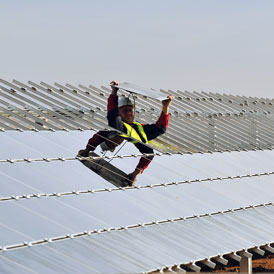Thousands of solar projects axed as government cuts tariffs
Thousands of housing associations abandon plans to provide solar panels for their residents after the government halves the cashback payments, making the scheme too expensive to maintain.
The government has suddenly announced it is slashing what it pays people for the electricity domestic solar panels make for the grid.
Thousands of housing associations are now cancelling contracts for solar panels, arguing they won’t be able to afford to run the scheme, and save their poorest tenants money on their electricity bills.
Many housing associations thought joining the government’s solar cash-back scheme was a way of getting with the green agenda and saving their tenants hundreds of pounds each on their rising fuel bills.
It looked like a win win situation, But that was until the government announced the tariff – the chance to earn 43 pence per kilowatt hour of electricity generated – was too generous and too expensive to continue. So the rate is being halved – to 21 pence an hour.
It’s so disappointing. Our tenants asked what we could do to help with their fuel bills and here was a scheme they could really see the benefit from. John Shortt, director at charitable housing association AmicusHorizon
Cancelled contracts
AmicusHorizon, a charitable housing association in London and the South East, has cancelled the contract to put solar panels on 5,000 roofs. It says the sums just don’t stack up any more – it can’t afford the installation costs. It means its tenants, half of whom are in what is called fuel poverty (they spend more than 10 per cent of their income just on heating their homes), just lost the chance to save on their heating bills.
John Shortt, a director at AmicusHorizon says he had no choice but to abandon the scheme.

“It’s so disappointing. Our tenants asked what we could do to help with their fuel bills and here was a scheme they could really see the benefit from.
“Our residents will suffer the most. They would have saved several hundred pounds a year on average – which is an awful lot of money for people on low incomes.”
On the doorstep of one of AmicusHorizon’s houses, Yakout Meihaoui said fuel bills were a terrible worry.
“Every single friend I have, for them it’s a huge problem – when you have to eat less to pay your bills. I have just received £324 bill for gas and electricity – which is too much for someone on a low income.”
Fuel poverty
The Solar Trade Association has told Channel 4 News around 100,000 social housing solar projects have been cancelled with the announcement of the cut in the government tariff. The Department of Energy and Climate Change says there was no need, as the 21 pence tariff will still net a 5 per cent return on the investment in solar panels. John Shortt says that return looks possible on paper, but in the real world, in which not all properties have roofs facing the right way, or need repairing, the return is non-existent.
Meanwhile he’ll have to look at other ways of helping his tenants in fuel poverty – the numbers of which are rising.
The solar panel tariff was never designed to lift people out of fuel poverty. The government says it is committed to helping them in other ways, for example winter fuel payments and investment in insulation. But some tenants – promised protection from rising bills through solar panels – feel they are the accidental victims of the government’s changing green policy.